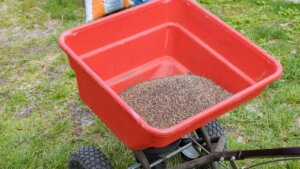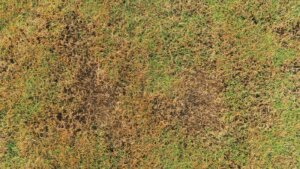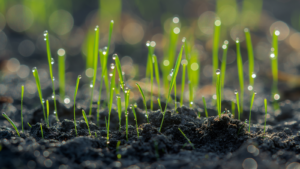When you fertilize your lawn, watering afterward is a pivotal step in the lawn care routine. It’s the bridge between applying lawn fertilizer and ensuring nitrogen and other nutrients are properly absorbed. But how you water the lawn after this process is critical.
Granular vs. Liquid Fertilizer:
- Granular Fertilizer: Irrigating immediately is crucial to help activate the nitrogen and nutrients.
- Liquid Fertilizer: After application, give it 2-4 hours to settle before you water the lawn.
Key Insight: For spot weed treatments, allow the treatment to dry to preserve its efficacy before you irrigate.
How Much and How Long to Water After Fertilizing
According to the University of Wisconsin, it’s crucial to fertilize only as necessary. Over-fertilizing can be detrimental, as the runoff can pollute local ecosystems. Annual fertilization is generally recommended, but your lawn’s requirements dictate the precise schedule and quantity. This is where a soil test becomes invaluable, guiding you on the specific nutritional needs of your soil and, thus, the types and amounts of fertilizer required for your grass.
Seasonal Adjustments:
- Spring and Early Fall: Watering 1 to 2 times a week is adequate.
- Summer: You may need to increase irrigation frequency to 3-4 times a week to help your lawn cope with drought conditions.
Pro Tip: Water early in the morning to maximize absorption and minimize the risk of fungal diseases.
By following these guidelines, you can ensure that when you water and fertilize your lawn, you’re promoting a lush, healthy growth that will be the envy of the neighborhood.
Leveraging Rainfall and Avoiding Over-Watering
Rainfall can significantly aid your lawn care routine, especially when it comes to integrating moisture after lawn fertilizing. By applying fertilizer onto your lawn just before predicted light rainfall, you can naturally help distribute the nutrients. Conversely, if a downpour is expected, hold off to prevent washing the fertilizer off your entire lawn.
Post-Fertilization Care:
- Wait a Couple of Days: Post-fertilization, allowing your grass to absorb the nutrients is wise.
- Resume Regular Watering: Stick to a schedule that provides your lawn with deep, infrequent watering, which can be easily managed with a reliable irrigation system.
Choosing the Right Fertilizer for Your Lawn
The type of fertilizer you use on your lawn matters significantly. Each type (granular, liquid, etc.) has specific needs in terms of watering:
- Granular Fertilizers: Need to be watered in immediately.
- Liquid Fertilizers: Allow some time before watering.
Local Insights: In Collegeville, PA, consider the local soil type and climate when choosing your fertilizer. Consult with a lawn care professional to select the best option for your lawn’s unique needs.
Professional Lawn Care and Tailored Advice
Engaging with a lawn care expert for personalized care, including precise fertilizer application and aeration, can significantly benefit your lawn’s health. They can thoroughly evaluate your irrigation system and determine the optimal frequency of fertilizer application to maintain a healthy lawn.
Benefits of Professional Lawn Care:
- Tailored advice on how much to water your grass after fertilizer application.
- Customized treatments designed for your lawn’s specific environmental needs.
- Professional aeration services to improve the efficacy of fertilizer application.
Ultimately, correctly understanding when and how to apply fertilizer and water your lawn is essential for fostering a healthy, lush lawn. Correct irrigation and fertilization practices are the keystones of a vibrant lawn. For a rich, thriving lawn, professional expertise can be the difference-maker in your lawn maintenance routine.



